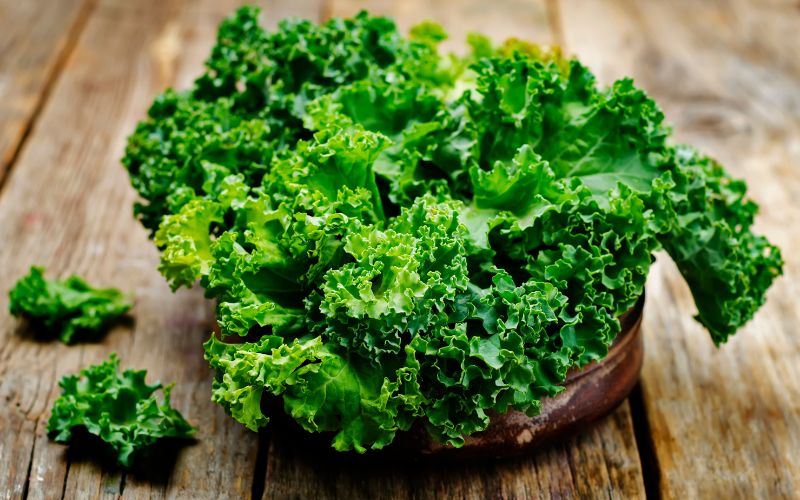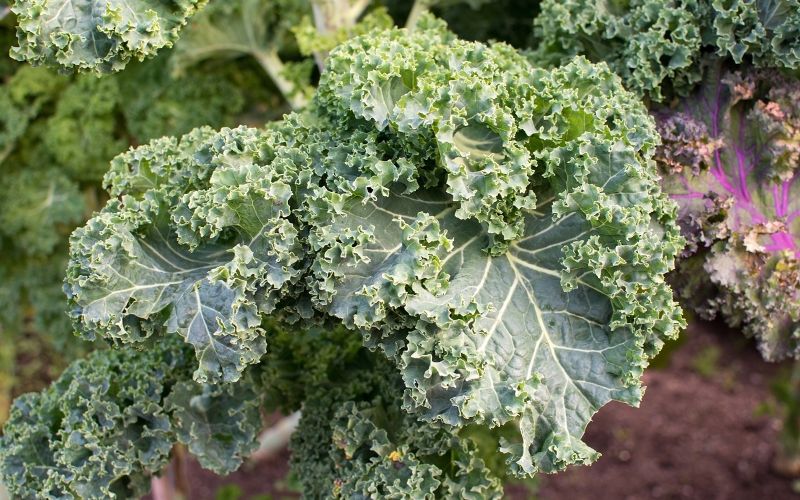As a pet owner, you may be wondering if Kale is good for dogs. After all, Kale is often touted as a superfood for humans.
But can dogs benefit from ale too?
The short answer is yes, Kale is safe for dogs to eat in moderation. Kale is a nutrient-rich leafy green that can offer some health benefits for your four-legged friend. However, Kale does contain oxalates which can cause problems for some dogs. So it’s important to talk to your vet before adding Kale to your dog’s diet.
Why kale is good for dogs
Kale is a powerhouse of nutrients. It’s packed with vitamins A, C, and K, as well as minerals like calcium and iron.
Kale also contains antioxidants and phytonutrients that can boost your dog’s health.
Some potential benefits of feeding Kale to your dog include:
- Improved digestion
- Reduced inflammation
- Better joint health
- Stronger bones and teeth
- Shinier fur
Things to consider before feeding Kale to your dog
As mentioned earlier, Kale does contain oxalates.
These are compounds that can bind to calcium in the body and cause problems for some dogs.
If you’re considering adding Kale to your dog’s diet, it’s important to talk to your vet first.
Additionally, Kale is a fairly high-fibre food. This means that it can cause gas and bloating in some dogs.
Start with a small amount of Kale and see how your dog reacts before increasing the amount you feed.
Kale should only be fed to dogs in moderation.
While Kale is a healthy food for dogs, it should not make up the majority of their diet.
A balanced diet for dogs includes meat, grains, and vegetables. Kale can be a great addition to your dog’s diet, but don’t forget about the other important food groups.
How much Kale can a dog eat safely?
There is no hard and fast rule for how much Kale a dog can eat.
Start with a small amount and see how your dog reacts.
If there are no problems, you can gradually increase the amount of Kale you feed. Just be sure not to overdo it.
Kale should only make up a small part of your dog’s diet.

Can dogs have Kale everyday?
Yes, dogs can have Kale every day as long as it’s given in moderation.
Be sure to start with a small amount and increase gradually.
And always talk to your vet before making any changes to your dog’s diet.
How should I feed Kale to my dog?
Kale can be fed to dogs cooked or raw.
If you’re feeding kale raw, be sure to wash it thoroughly first.
Kale can also be added to your dog’s food as a topping or mixed in with other vegetables.
What is the nutritional value of Kale for dogs?
Kale is a nutrient-rich food that can offer many benefits for dogs. I
t’s packed with vitamins, minerals, and antioxidants that can boost your dog’s health. Kale is also a good source of fibre.
Can Kale help my dog’s digestion?
Yes, Kale can help improve digestion in dogs.
Kale is a good source of fibre which can promote regularity. Kale can also help to soothe an upset stomach and reduce inflammation.
Can Kale help with joint pain?
Yes, Kale may help to reduce joint pain in dogs.
Kale contains antioxidants and anti-inflammatory compounds that can help to reduce swelling and pain.
Kale may also help to improve joint health by strengthening the bones and connective tissue.
Can Kale help my dog’s coat look shiny and healthy?
Yes, Kale can help to improve the appearance of your dog’s coat.
Kale is a good source of vitamins A and C, both of which are important for healthy skin and fur.
Kale may also help to reduce inflammation, which can lead to shinier and healthier fur.
Should I give my dog Kale supplements?
No, there is no need to give your dog Kale supplements.
Kale is a nutrient-rich food that can be easily added to your dog’s diet.
Kale supplements are not necessary and could even be harmful.
Stick to feeding Kale in its whole form for the best results.
Final Words
Kale is safe for dogs to eat in moderation.
Kale is a nutrient-rich leafy green that can offer some health benefits for your four-legged friend.
However, Kale does contain oxalates which can cause problems for some dogs. So it’s important to talk to your vet before adding Kale to your dog’s diet.
Start with a small amount and see how your dog reacts before increasing the amount you feed.
And always remember that Kale should only make up a small part of your dog’s diet.
A balanced diet for dogs includes meat, grains, and vegetables. Kale can be a great addition to your dog’s diet, but don’t forget about the other important food groups.




